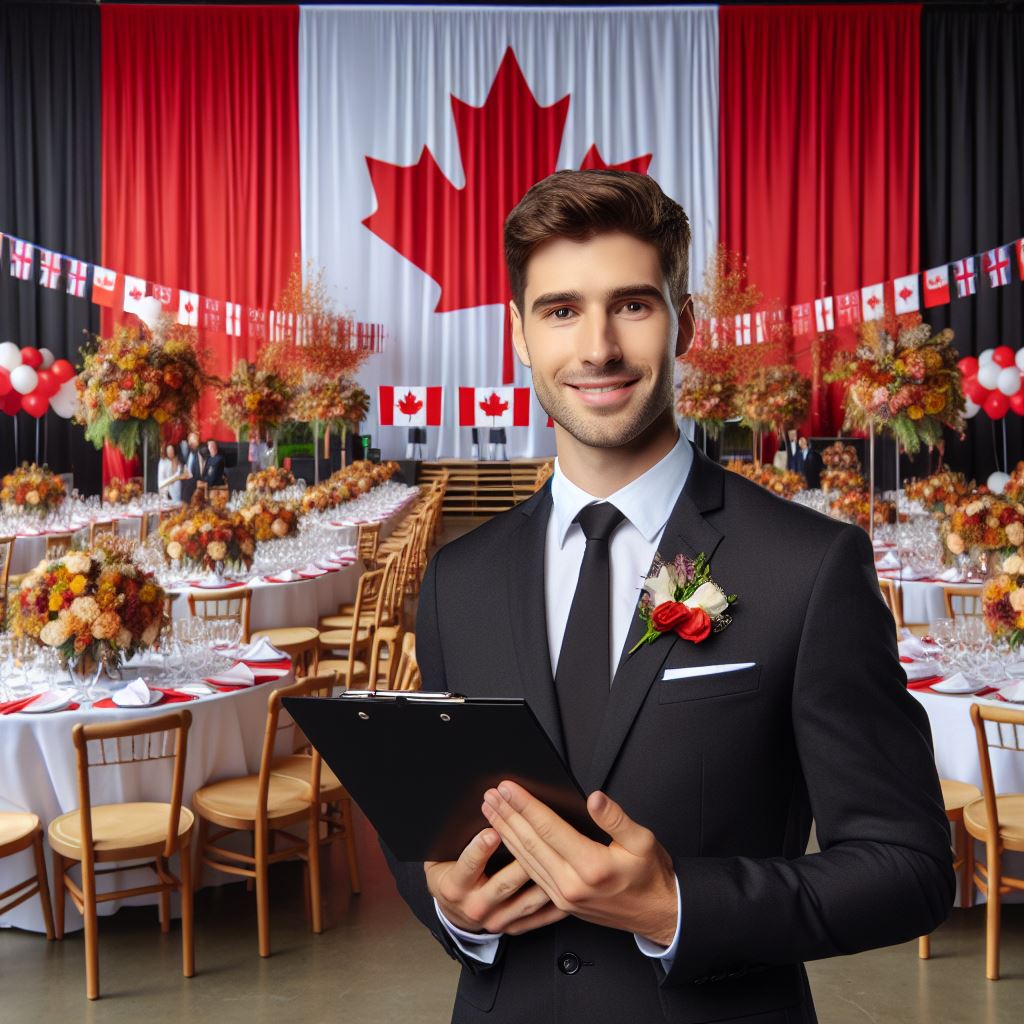Introduction
The importance of understanding event planning regulations in Canada
Understanding event planning regulations in Canada is crucial for successful event management.
Understanding event planning regulations in Canada is crucial for ensuring compliance, safety, and successful execution.
It fosters responsible event management, promotes public welfare, and helps organizers navigate legal requirements, contributing to the overall success and sustainability of events in the country.
The challenges and complexities involved in navigating these regulations
Navigating these regulations can be challenging and complex due to their intricacies.
Navigating event planning regulations in Canada presents challenges and complexities due to the diverse provincial regulations, varying permit processes, and evolving legal frameworks.
Ensuring compliance demands meticulous attention to detail, extensive coordination, and proactive engagement with authorities, reflecting the intricate nature of the regulatory landscape.
The purpose of the blog post
The purpose of this blog post is to provide an overview of Canadian event planning regulations.
Overview of Canadian Event Planning Regulations
Significance of Event Planning Regulations in Ensuring Safety and Compliance
Event planning regulations play a crucial role in safeguarding the well-being of event attendees.
These regulations ensure that events adhere to specific standards for safety and security.
Compliance with event planning regulations prevents accidents, injuries, and potential lawsuits.
Regulations also focus on risk management to minimize potential liability and protect event organizers.
By enforcing these regulations, authorities hold event planners accountable for their actions.
Ultimately, strict adherence to regulations enhances the reputation and credibility of event planning industry.
Different Regulatory Bodies and Agencies Involved
The primary regulatory authority responsible for event planning in Canada is the provincial government.
Each province has its own set of regulatory bodies overseeing event planning activities.
In Ontario, for example, the Alcohol and Gaming Commission handles permits for events involving alcohol.
Regulatory agencies such as Health Canada and the Canadian Food Inspection Agency regulate food-related aspects of events.
Organizations like the Canadian Centre for Occupational Health and Safety focus on workplace safety at events.
Legal Responsibilities and Obligations for Event Planners in Canada
Event planners have the legal responsibility to obtain necessary permits and licenses for their events.
They must comply with building codes, fire safety regulations, and accessibility standards.
Contractual obligations involve ensuring that vendors and suppliers have necessary licenses and insurance.
Event planners are obligated to conduct risk assessments and implement appropriate safety measures.
They must also address potential risks related to food handling, crowd management, and venue security.
Ensuring compliance with copyright laws is another crucial obligation of event planners.
Failure to fulfill these legal responsibilities may result in penalties, fines, and even the cancellation of events.
Unlock Your Career Potential
Visualize a clear path to success with our tailored Career Consulting service. Personalized insights in just 1-3 days.
Get StartedEssentially, event planning regulations in Canada play a vital role in ensuring safety, compliance, and risk management.
By adhering to these regulations, event planners contribute to the reputation and credibility of the industry.
The involvement of various regulatory bodies and agencies demonstrates the comprehensive nature of event planning regulations.
Event planners must understand and fulfill their legal responsibilities and obligations to avoid penalties and protect attendees.
Read: Building a Portfolio as a Canadian Event Planner

Types of Events and Relevant Regulations
Events in Canada can range from weddings, conferences, festivals, trade shows, sporting events, and more.
Each type of event has its unique requirements and regulations that need to be followed.
Specific Regulations and Permits Required for Each Type of Event
When planning an event, it is essential to be aware of the specific regulations and permits required for each type of event.
Licencing and Permit for Alcoholic Beverarge
If your event includes serving alcohol, you must ensure you have the necessary licenses and permits.
Depending on the province or territory, different regulations and permits may apply.
It is crucial to research and comply with the specific requirements of the jurisdiction where the event will take place.
Rules and Regulations for Food Handling and Catering
Food handling and catering at events must adhere to strict rules and regulations to ensure the safety of attendees.
Event organizers should work with licensed and reputable food vendors who follow health and hygiene guidelines.
Proper food storage, preparation, and handling techniques should be implemented to prevent foodborne illnesses.
Safety and Security Regulations for Large-Scale Events
Large-scale events require meticulous attention to safety and security measures for the well-being of all participants.
Event organizers must work closely with local authorities and security personnel to develop comprehensive plans.
Measures may include crowd control, emergency evacuation plans, medical facilities, and communication systems.
It is vital to conduct thorough risk assessments and have contingency plans in place for potential emergencies.
Generally, understanding the relevant regulations for event planning in Canada is crucial for smooth and successful event execution.
Different types of events have specific requirements, and it is essential to research and follow the appropriate regulations and obtain the necessary permits.
Whether it’s obtaining licenses for serving alcoholic beverages, ensuring compliance with food handling guidelines, or implementing safety and security measures for large-scale events, event planners must prioritize adherence to regulations to create a safe and enjoyable experience for attendees.
Read: The Future of Event Planning in Canada Post-COVID
Understanding Local Bylaws and Regulations
Importance of researching and understanding local bylaws and regulations
When planning an event in Canada, thorough research and understanding of local bylaws and regulations is crucial.
Bylaws and regulations can vary significantly across provinces and municipalities, necessitating careful consideration.
Non-compliance with local regulations can lead to penalties and fines, resulting in financial losses and potential disruptions to events.
Therefore, event planners must familiarize themselves with the specific bylaws and regulations applicable to their event location.
Local regulations are designed to promote safety, protect public health, and maintain community order.
By understanding and adhering to these regulations, event planners can ensure that their events are held responsibly and in line with the expectations of the local community.
Examples of common local regulations that vary across different provinces or municipalities
The specific regulations that event planners need to be aware of will vary depending on the province or municipality hosting the event.
Here are some common examples:
Noise restrictions
Different municipalities may have different noise restrictions, impacting events held outdoors or in noise-sensitive areas.
Event planners need to consider potential noise complaints and select suitable venues.
Alcohol permits and licenses
The requirements for selling or serving alcohol vary across provinces.
Event planners must ensure they possess the necessary permits and licenses specific to the event location.
Prohibited or restricted items
Certain items, such as fireworks or drones, may be prohibited or restricted in some municipalities due to safety or noise concerns.
Event planners need to comply with these restrictions.
How to access and interpret local bylaws and regulations
Event planners can follow these steps to access and interpret local bylaws and regulations:
Start by visiting the official website of the municipality, province, or territory where the event will take place.
Most local governments provide information on their websites.
Contact the relevant local government offices or departments responsible for licensing and permits.
They can guide event planners on the specific regulations and any required permits for their event.
Seek advice from professional event planning associations or consult legal experts experienced in navigating local regulations.
They can provide insights and guidance tailored to the event planning industry.
Connect with experienced event planners who have organized events in the specific locality.
They can share their knowledge and experiences, helping new event planners understand and comply with local regulations.
Stay updated on any changes or updates to local bylaws and regulations.
Regularly check official sources and stay informed through local government announcements or newsletters.
In summary, thorough research and understanding of local bylaws and regulations are essential for event planners in Canada.
By complying with these regulations, event planners contribute to public safety, foster positive community relations, and ensure the success of their events.
Read: The Role of Technology in Event Planning in Canada
Compliance and Documents for Event Planners
Necessary documents/event planning tools required for compliance
Permits, Licenses, and Certificates
Event planners need to obtain the appropriate permits, licenses, and certificates required by relevant authorities.
Examples include:
- Special event permits: For events held in public spaces or requiring road closures.
- Liquor licenses: When serving alcohol at an event.
- Health and safety certificates: To ensure compliance with health and safety regulations.
Planners should research and understand the specific requirements for each event to avoid legal issues.
Event Risk Assessments and Emergency Protocols
Event planners must conduct thorough risk assessments and establish emergency protocols to protect participants and staff.
Key steps include:
- Identifying potential hazards and risks associated with the event.
- Developing a safety plan and emergency response procedures.
- Training staff and volunteers on emergency protocols.
- Communicating emergency procedures to participants and attendees.
By anticipating risks and having appropriate measures in place, event planners can minimize the impact of emergencies.
Insurance Coverage Requirements
Event planners need to consider insurance coverage to protect themselves and participants from potential liabilities.
Common types of insurance coverage include:
- General liability insurance: Protects against claims of bodily injury or property damage.
- Event cancellation insurance: Covers losses due to event cancellations or disruptions beyond the planner’s control.
- Liquor liability insurance: Required when alcohol is served at an event.
Event planners should consult with insurance professionals to determine the appropriate coverage based on their event’s specific needs.
How event planners can ensure compliance and have necessary documents in place
Event planners have a responsibility to ensure compliance with Canadian event planning regulations.
To achieve this, they must have the necessary documents and event planning tools in place.
To ensure compliance and have the necessary documents in place, event planners should follow these guidelines:
- Review and understand local regulations: Familiarize yourself with the event planning regulations in the specific Canadian jurisdiction where the event will take place.
- Identify necessary permits and licenses: Research the required permits and licenses and initiate the application process early to allow for any potential delays.
- Conduct a comprehensive risk assessment: Evaluate potential risks associated with the event and create a detailed risk management plan.
- Develop emergency protocols: Establish clear procedures for different emergency scenarios and communicate them to staff, volunteers, and participants.
- Obtain appropriate insurance coverage: Seek guidance from insurance professionals to determine the necessary coverage and secure policies well in advance of the event.
- Maintain accurate documentation: Keep all permits, licenses, certificates, risk assessments, emergency protocols, and insurance policies easily accessible for future reference.
By prioritizing compliance and being proactive in obtaining the required documents, event planners can create successful and legally compliant events in Canada.
Read: Event Planning in Canada: Niche Markets to Explore
Staying Updated on Regulatory Changes
Importance of staying updated on any changes to event planning regulations
Staying aware of changes to event planning regulations is of utmost importance for event planners.
Regulations can evolve based on various factors such as safety concerns, industry trends, or legal requirements.
Being ignorant of these changes can have serious consequences, including fines, event cancellation, and damage to your reputation.
Available resources such as websites, newsletters, and industry associations
One way to stay updated is by regularly visiting government websites that provide official information on event planning regulations.
These websites often publish relevant documents, such as guideline changes or new permit requirements.
By checking these sources periodically, you can ensure you are aware of any modifications to the regulations that affect your event planning.
In addition to government websites, subscribing to newsletters from industry associations and event planning groups can be beneficial.
These newsletters often include updates on regulatory changes and provide insights into best practices.
They may also contain information on upcoming events or conferences where important discussions regarding event planning regulations take place.
Industry associations are an excellent resource for staying abreast of regulatory updates.
By joining such associations, you gain access to forums, webinars, and educational resources where event planning regulations are frequently discussed.
Moreover, you have the opportunity to network with other professionals who can provide valuable insights and share experiences related to navigating regulatory changes.
Tips on how to stay abreast of any regulatory updates
Being proactive in seeking out information is key to staying updated.
Following industry-specific news sources that cover event planning regulations extensively will help you keep track of any updates or amendments.
These news sources often interview regulatory authorities or experts and provide expert analysis on the implications of new regulations.
By staying informed through such sources, you can adapt your event planning strategies accordingly.
Attending networking events and conferences is another effective method to stay informed about regulatory changes.
These gatherings bring together event planning professionals, regulatory authorities, and industry experts.
Engaging in conversations and discussions during these events can provide valuable insights into upcoming regulatory changes, as well as practical advice from experienced event planners who have successfully adapted to past regulatory updates.
Furthermore, establishing connections with regulatory authorities can be beneficial.
By building relationships with officials responsible for overseeing event planning regulations, you may receive direct updates whenever changes occur.
This direct communication can give you a competitive advantage by allowing you to prepare for regulatory changes well in advance and adapt your event planning strategies accordingly.
Ulimately, staying updated on regulatory changes is crucial for event planners to ensure compliance and success.
By utilizing available resources such as government websites, newsletters, and industry associations, event planners can stay abreast of any changes in event planning regulations.
Additionally, actively seeking out information through industry-specific news sources and participating in networking events can further enhance their knowledge and understanding of regulatory updates.
Being proactive and staying informed will enable event planners to navigate Canadian event planning regulations effectively and efficiently.
Conclusion
The key points discussed in the blog post
To sum it up, understanding and complying with Canadian event planning regulations is crucial for success in the industry.
Throughout this blog post, we have discussed key points such as the importance of obtaining permits, following guidelines for food and alcohol service, and ensuring the safety of attendees.
The importance of understanding and complying with Canadian event planning regulations
Complying with these regulations not only protects event attendees but also safeguards the reputation and credibility of event planners.
Neglecting to adhere to these regulations can lead to legal consequences and damage to the event planner’s professional reputation.
Encouragement for ongoing learning and professional development in the field of event planning in Canada
It is important for event planners to prioritize ongoing learning and professional development in the field of event planning in Canada.
Staying informed about changing regulations and industry best practices ensures continued success in planning and executing events.
By staying up to date with regulations, event planners can create enjoyable and safe experiences for attendees while also growing their own expertise and reputation in the industry.
Overall, understanding, following, and continuously learning about Canadian event planning regulations is vital for event planners in Canada to thrive professionally and provide exceptional experiences for their clients.




